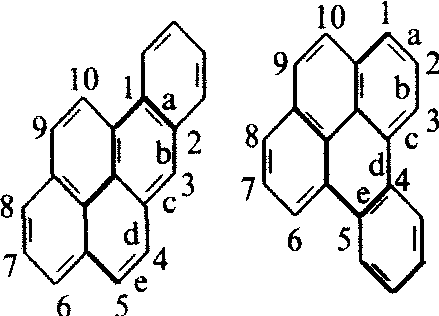苯并芘benbingbi
含5个环的稠环芳烃,分子式 C20H12。其中1,2-苯并芘 (苯并[α]芘) 为深黄色晶体,熔点为177.8℃; 最初由煤焦油中分离得到,从煤烟、焦油、沥青、香烟烟雾中都可以查出,有强烈的致癌作用,可以诱发肺癌,其在大气中的含量已经列入环境监测的常规项目。4,5-苯并芘 (苯并[e]芘) 是1,2-苯并芘的同分异构体,存在于煤烟和焦油中,也具有致癌作用。

1,2-苯并芘 4,5-苯并芘
苯并〔a〕芘苯并 〔e〕芘
| 词条 | 苯并芘 |
| 类别 | 中文百科知识 |
| 释义 | 苯并芘benbingbi含5个环的稠环芳烃,分子式 C20H12。其中1,2-苯并芘 (苯并[α]芘) 为深黄色晶体,熔点为177.8℃; 最初由煤焦油中分离得到,从煤烟、焦油、沥青、香烟烟雾中都可以查出,有强烈的致癌作用,可以诱发肺癌,其在大气中的含量已经列入环境监测的常规项目。4,5-苯并芘 (苯并[e]芘) 是1,2-苯并芘的同分异构体,存在于煤烟和焦油中,也具有致癌作用。
|
| 随便看 |
开放百科全书收录579518条英语、德语、日语等多语种百科知识,基本涵盖了大多数领域的百科知识,是一部内容自由、开放的电子版国际百科全书。